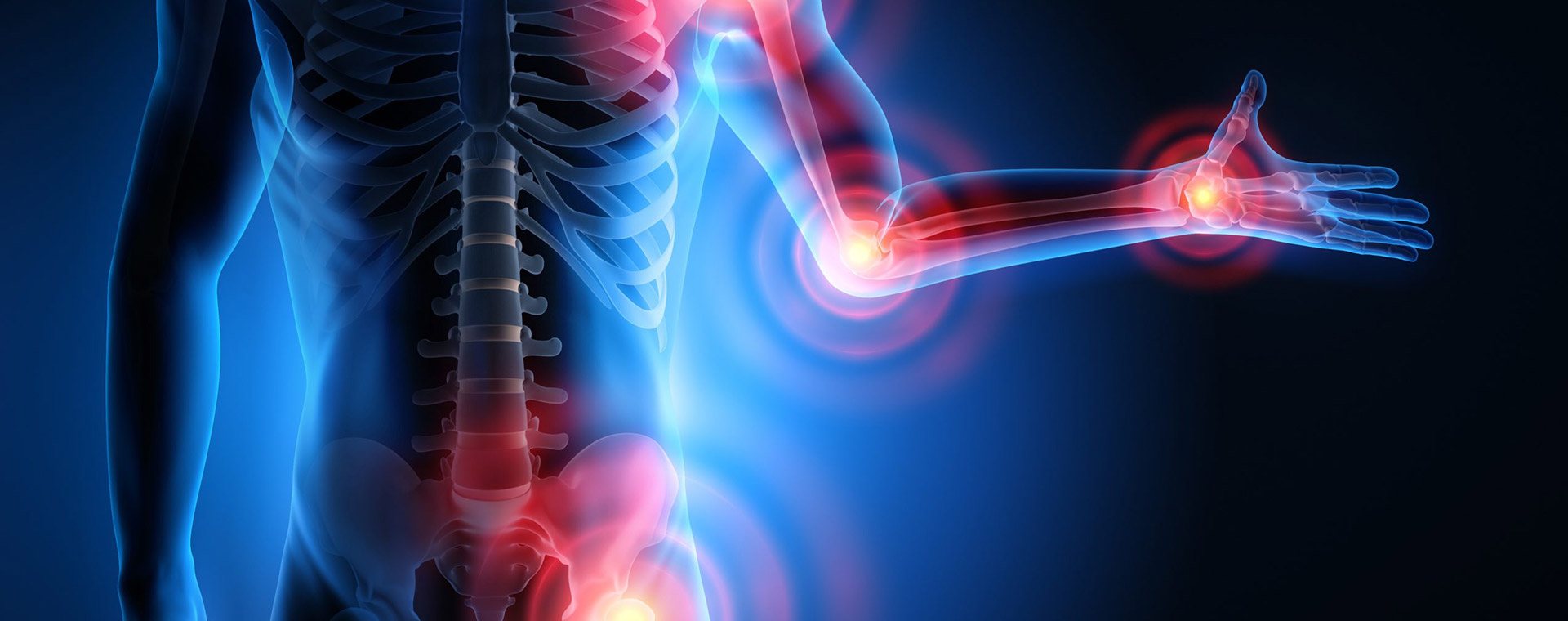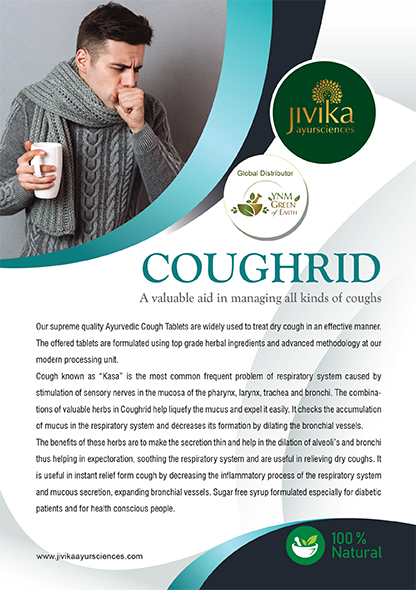Our supreme quality Ayurvedic Cough Tablets are widely used to treat dry cough in an effective manner. The offered tablets are formulated using top grade herbal ingredients and advanced methodology at our modern processing unit.
Cough known as “Kasa” is the most common frequent problem of respiratory system caused by stimulation of sensory nerves in the mucosa of the pharynx, larynx, trachea and bronchi. The combinations of valuable herbs in Coughrid help liquefy the mucus and expel it easily. It checks the accumulation of mucus in the respiratory system and decreases its formation by dilating the bronchial vessels.
The benefits of these herbs are to make the secretion thin and help in the dilation of alveoli’s and bronchi thus helping in expectoration, soothing the respiratory system and are useful in relieving dry coughs. It is useful in instant relief form cough by decreasing the inflammatory process of the respiratory system and mucous secretion, expanding bronchial vessels. Sugar free syrup formulated especially for diabetic patients and for health conscious people.
Table Composition
Each chewable tablet contains:-
- Mulethi ext. (Glycyrrhiza glabra) 60mg
- Tulsi ext. (Ocimum sanctum) 60mg
- Unnav ext. (Zizyphus sativa) 60mg
- Kakdasingi ext. (Pistacia integerrima) 40mg
- Banafsa ext. (Viola odorata) 25mg
- Puskarmool ext. (Inula racemosa) 25mg
- Bharangi ext. (Clerodendron serratum) 25mg
- Bansa ext. (Bambusa arundinacea) 25mg
- Dalchini ext. (Cinnamomum zeylanicum) 25mg
- Pudina satva (Mentha piperita) 5mg
Ingredients Highlight
Vasaka (Adhatoda vasica) acts as sedative, expectorant, antispasmodic, antiseptic, expectorant and anthelmintic. It is used in treating bronchitis, cold, whooping cough and asthma.
Tulsi ext. (Ocimum sanctum) treating fever, headache, nausea, vomiting, cholera, influenza, cough, cold, asthma, sinusitis, bronchitis, migraine, sore throat, stress, malaria, indigestion, hysteria, insomnia and certain skin disorders including ring-worms.
Kantkari (Solanum xanthocarpum) possess carminative, anthelmintic and bitter properties. It is expectorant and used in treatment of toothache, chest pain due to cough, asthma and bronchitis.
Yastimadhu ext. (Glycyrrhiza glabra) is combined with other herbs in treating coughs, colds, sore throat, asthma, stomach and duodenal ulcers, hepatitis, hysteria, food poisoning, hypoglycemia, bronchitis, colitis, diverticulitis, gastritis, some of stress related disorders, nausea, and inflammation.
Kulinjan (Alpinia galanga) has carminative, ant tuberculosis and stimulant properties.
Somlata (Ephedra gerardiana) used for treating respiratory disorders including coughs, colds, asthma, sinus, bronchitis, allergies and controls weight gain, lowers blood pressure, relieves fever, chills, aching joints and bone pains.
Banafsa ext. (Viola odorata) used as an herbal remedy in cases of various respiratory ailments. It can be very beneficial in treatment of congestion, coughs and sore throat.
Piper (Piper longum) used to treat stomachache, bronchitis, cough, tumors, diseases of the spleen, insomnia, epilepsy, gonorrhea, diarrhea, cholera, scarlatina, chronic malaria, hepatitis B, asthma, and or as a rejuvenator, aromatic, stimulant and carminative.
Pudina satva (Mentha piperita) possesses immunostimulant, decongestant, expectorant, antibacterial, antifungal, antispasmodic and antiviral agents.
Puskarmool ext. (Inula racemosa)used in Respiratory Tract Conditions such as asthma, bronchial disease, chest (pericardial) pain, chronic bronchitis with cardiac complications, cough, dyspnea, protects against bronchospasm induced by histamine, serotonin and pollens
Bharangi ext. (Clerodendron serratum) is used clinically in treatment of bronchitis, asthma, fevers, blood disease, and tumors’, inflammations, burning sensation, epilepsy, malaria, ulcer and wounds.
Unnav ext. (Zizyphus sativa) used for treatment of biliousness, chronic bronchitis, blood diseases or as analeptic and expectorant
Bansaext. (Bambusa arundinacea) pacifies vitiated kapha, pitta, indigestion, diarrhea, amenorrhea, Ulcer, muscle spasm, inflammation and general weakness.
Dalchini ext. (Cinnamomum zeylanicum) prescribed as a cure for respiratory disorders including flu, sinus, asthma and chronic inflammation of the mucous membrane.
Pudina satva (Mentha piperita) possesses immunostimulant, decongestant, expectorant, antibacterial, antifungal, antispasmodic and antiviral agents.
Kakdasingi ext. (Pistacia integerrima) is used in the treatment of coughs, phthisis, asthma, dysentery etc.
Baheda (Terminalia belerica) properties include anthelmintic, antiseptic, astringent, expectorant, laxative, lithotriptic, rejuvenative and tonic. It is used in treating asthma, biliousness, bronchitis, inflammations, sore throat, eye, nose, and heart disorders.
Piper (Piper longum)used to treat stomachache, bronchitis, cough, tumors, diseases of the spleen, insomnia, epilepsy, gonorrhea, diarrhea, cholera, scarlatina, chronic malaria, hepatitis B, asthma, and or as a rejuvenator, aromatic, stimulant and carminative.
Nosadar is as an expectorant. An expectorant is a drug that stimulates, depresses, or modifies the secretion from the bronchial or laryngeal mucus membranes and promotes its expulsion. This simply means that expectorants are used to stimulate the production of phlegm and ultimately cause the phlegm to be coughed up.
Possible Indications
Cough and cold, bronchial congestion, thick mucus secretion, allergic bronchitis, smokers cough, whooping cough, recurrent respiratory tract infection, purulent mucous discharge, tuberculosis cough, immune deficiency.
Usage and Benefit
1) Cough of allergic, infective or asthmatic origin.
2) Cough associated with gastro-esophageal reflux
3)Cough caused due to irritants – smokers’ cough
Do’s
1) Gargling with salt water is recommended.
2) Herbal inhalation of warm water with camphor and mint is advised.
3) Speaks less and if required in soft and low pitch is advised.
4) Oil massage followed by hot fomentation over chest and back especially in case of chest congestion.
5) Perform Deep inhalation and exhalation at least two times a day.
Don’ts
1) Avoid exposure to cold wind and rain.
2) Avoid cold water refrigerated food products and ice-cream.
3) Avoid smoking and exposure to chemicals industrials fumes pollen and dust.
4) Avoid tobacco chewing, oily and spicy food.
Dosage
Chew or suck One to two tablets thrice a day or as required or as directed by the physician.
Capsule: one to two capsules twice a day or as directed by the physician.
Side Effects
No adverse/ toxic effects have ever been observed in short/ long term usage of Coughrid in recommended dosage.
Caution
Keep the medicine away from direct sunlight, moisture and reach of children.










